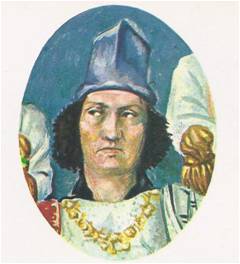Henry Tudor was a patient young man, who waited and watched while civil war raged in England and quarreling lords fought to see who would be king. He waited safely in France, biding his time until his spies told him the hour had come to strike. Then from northern France he crossed the English Channel with 2000 soldiers. Ahead of Henry and his soldiers had gone his agents, who sought to weaken the position of England’s King, Richard III. Henry’s agents had plotted secretly with some of Richard’s supporters, lords who led small armies of their own. That was why …
Read More »Tag Archives: Holy Roman Empire
Emperor of the French 1804 -1815
On December 2, 1804, in a ceremony of great pomp and splendour at the cathedral of Notre Dame in Paris, Napoleon Bonaparte was crowned Napoleon I, Emperor of the French. Pope Pius VII was there. He had come from Rome to offer his blessing and to place the crown on the head of the new emperor but Napoleon did not do what was expected of him. Instead of kneeling, he took the crown from the Pope’s hands and put it on himself. He also placed a crown on the head of his wife, Josephine. Only twelve years had passed since …
Read More »The Thirty Years War 1618 – 1625
EMPEROR MAXIMILIAN I of the Holy Roman Empire walked up to a wild lion and pulled out its tongue; his enemies set his house on fire, tried to poison him and ambushed him twenty times; wild bears attacked him three times, stupid servants ignited powder kegs near him and five boats capsized under him, but always he escaped unharmed. He was a greater general than Julius Caesar, a brilliant musician, scholar and inventor. All these stories were proof that Maximilian was a great hero — but they were written by authors whom Maximilian himself hired to do the job. He …
Read More »France Becomes a Great Nation 1453-1631
WHEN MORE than a century of war between England and France ended in 1453, it was the French king, Charles VII, who was victorious. Although he had driven the English out of France, Charles found himself the king of a sad land. During the wars the great French nobles had fought among themselves as bitterly as they had fought the English and they had become so powerful that they no longer respected their king. France itself was devastated, the people poor and hungry. Paris had been half ruined. Wolves prowled the city by night and twenty-four thousand houses stood empty. …
Read More »Feudal Germany 936 -1250
THE WINTER of 1077 was one of the coldest on record in Italy. Ice and snow choked the mountain passages in the north and snowdrifts were piled high well into the south — as far south as the castle of Canossa, which was southeast of Parma. The fortified castle belonged to the countess of Tuscany and here Pope Gregory VII had taken refuge, fearing an attack by his enemies. On January 25, a man stood outside the Castle gate, barefoot in spite of the snow and cold. He was no ordinary penitent come to ask forgiveness of the pope. He …
Read More »



